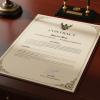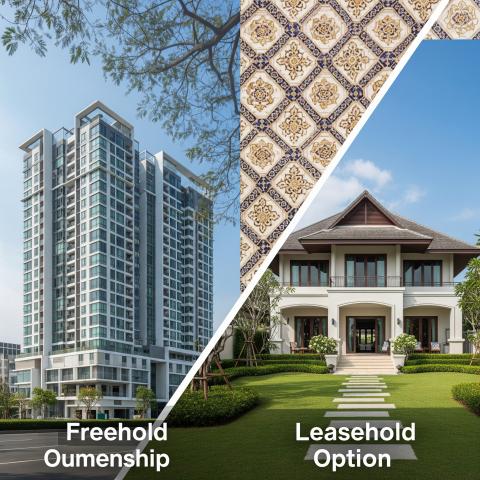Navigating Thailand Property Law: Expert Legal Services for Foreigners
Secure your Thai property investments with PS Law & Business. Our expert Bangkok property lawyers guide foreigners through purchases, leases, and legalities.
Investing in or leasing property in Thailand presents unique opportunities and challenges, especially for foreign nationals. The legal landscape surrounding property ownership and rights can be complex, involving specific regulations that differ significantly from those in other countries. At PS Law & Business, our dedicated team of Thai property lawyers in Bangkok possesses in-depth knowledge and extensive experience in all facets of property law, ensuring your interests are protected every step of the way.
Whether you are looking to buy a condominium, secure a long-term lease, understand foreign ownership restrictions, or require assistance with property due diligence, our English-speaking lawyers are here to provide clear, practical, and effective legal solutions. We understand the concerns of international clients and are committed to making your property transactions in Thailand smooth and secure.
Our Thailand Property Law Services
PS Law & Business offers a comprehensive suite of property law services tailored to meet the diverse needs of our foreign clients, including:
- Property Due Diligence: Before any purchase, a thorough investigation is crucial. We examine title deeds (Chanote, Nor Sor Sam Gor, etc.), encumbrances, zoning regulations, building permits, and any potential legal issues associated with the property. Our meticulous due diligence helps you make informed decisions and avoid future complications.
- Buying and Selling Property: We guide you through the entire process of purchasing or selling property in Thailand, including condos, villas (often via leasehold or company structures for foreigners), and land (where foreign ownership is restricted but alternative structures exist). This includes drafting and reviewing sale and purchase agreements (SPA).
- Leasehold Agreements: Foreigners can legally lease land or property in Thailand for up to 30 years, often with options for renewal. We specialize in structuring robust leasehold agreements that protect your long-term interests.
- Foreign Ownership Structures: While direct foreign ownership of land is generally prohibited, we can advise on and establish legally sound structures, such as Thai limited companies, that can own land, ensuring compliance with all regulations.
- Condominium Purchases: Foreigners can own condominiums freehold, provided certain conditions under the Condominium Act are met (e.g., the foreign ownership quota in the building is not exceeded and funds are remitted from overseas). We manage the entire purchase process.
- Usufruct, Superficies, and Servitudes: We provide expert advice and registration services for rights such as usufruct (right to use and benefit from a property owned by another), superficies (right to own a building on another's land), and servitudes (rights of way).
- Property Development & Construction: We assist developers and individuals with legal aspects of property development projects, including licensing, construction contracts, and regulatory compliance.
- Property Dispute Resolution: Should disputes arise concerning property rights, boundaries, or contractual obligations, our litigation team is prepared to represent your interests in negotiations, mediation, or court proceedings.
- Title Deed Searches and Transfers: We conduct thorough title deed searches at the relevant Land Department offices and manage the secure transfer of property ownership.
Understanding Key Aspects of Thai Property Law for Foreigners
Navigating Thai property law requires an understanding of several key concepts:
- Land Titles: Thailand has various types of land title deeds, with the Chanote (Nor Sor Si Jor) offering the strongest ownership rights. Understanding the specific title deed is essential.
- Foreign Ownership Limitations: As a general rule, foreigners cannot directly own land in Thailand. However, they can own buildings or structures on leased land and own condominium units freehold within specific limits.
- Lease Agreements: A common way for foreigners to secure long-term use of land. Leases are registrable for up to 30 years.
- Due Diligence: Essential to uncover any legal issues, liens, or encumbrances before committing to a property transaction.
Why Choose PS Law & Business for Your Property Law Needs?
- Expertise in Thai Property Law: Our lawyers have specialized knowledge of the intricacies of Thai property regulations and practices.
- Focus on Foreign Clients: We understand the unique challenges faced by foreigners and provide clear, culturally sensitive advice in English.
- Comprehensive Service: From initial consultation and due diligence to contract negotiation, registration, and dispute resolution, we cover all aspects of property law.
- Based in Bangkok, Serving Thailand: While located in the heart of Bangkok, we can assist with property matters throughout Thailand.
- Transparent and Client-Focused: We prioritize clear communication and provide transparent fee structures.
Dealing with property matters in a foreign country can be daunting. Let the experienced property lawyers at PS Law & Business provide you with the peace of mind that comes from knowing your investment is legally sound and your rights are protected. We are committed to delivering practical and effective legal solutions for all your property needs in Thailand.
Frequently Asked Questions (FAQ) - Property Law in Thailand
Can a foreigner own land in Thailand?
Generally, no. Thai law restricts freehold land ownership by foreigners. However, foreigners can own buildings or structures on land and can acquire land through long-term leases or by setting up a Thai limited company under specific conditions. Our lawyers can explain these options in detail.
What is the safest way for a foreigner to buy property in Thailand?
Buying a condominium freehold (within the foreign ownership quota) is often the most straightforward and secure method. For land and houses, a registered long-term leasehold combined with ownership of the building, or ownership via a properly structured Thai company, are common approaches. Thorough due diligence by a qualified lawyer is crucial in all cases.
What is a Chanote title deed?
A Chanote (Nor.Sor.4.Jor) is the strongest type of land title deed in Thailand, providing full ownership rights and clearly defined, accurately surveyed boundaries. It is the preferred title for property transactions.
How long can a foreigner lease land in Thailand?
A foreigner can lease land for a maximum period of 30 years. The lease agreement can often include provisions for renewal, though this is a contractual right rather than a guaranteed extension of the registered lease term.
What is property due diligence and why is it important?
Property due diligence is a comprehensive investigation into a property before purchase. It involves checking the title deed, ownership history, registered encumbrances (like mortgages or liens), access rights, zoning laws, and building permits. It's vital to uncover any potential legal issues or risks associated with the property.
Do I need a lawyer to buy property in Thailand?
While not legally mandatory for all steps, it is highly advisable, especially for foreigners. An experienced Thai property lawyer will protect your interests, ensure legal compliance, conduct thorough due diligence, review and draft contracts, and guide you through the complex legal procedures.
External Links for Further Information
- Thailand Department of Lands: Official information on land titles and regulations (may have limited English content).
- Thailand Board of Investment (BOI): Provides information on foreign investment in Thailand, which can sometimes relate to property for business purposes.






